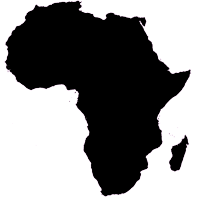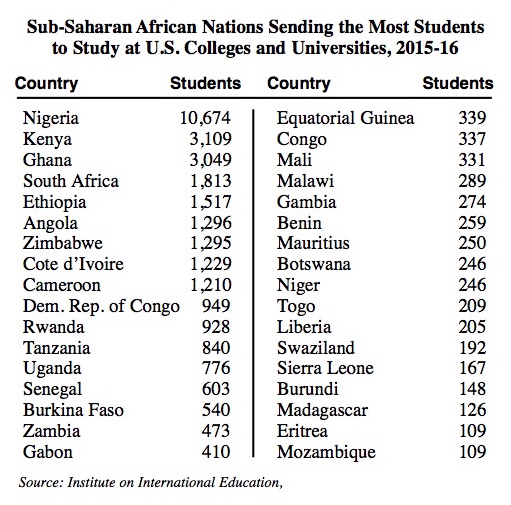 The Institute for International Education reports that in the 2015-16 academic year, there were 35,364 students from sub-Saharan Africa enrolled at colleges and universities in the United States. They made up 3.4 percent of the 1,043,839 foreign students at U.S. colleges and universities that year. The number of students from sub-Saharan Africa was up 5.3 percent from the prior year.
The Institute for International Education reports that in the 2015-16 academic year, there were 35,364 students from sub-Saharan Africa enrolled at colleges and universities in the United States. They made up 3.4 percent of the 1,043,839 foreign students at U.S. colleges and universities that year. The number of students from sub-Saharan Africa was up 5.3 percent from the prior year.
Among sub-Saharan African nations, Nigeria in 2015-16 sent the most students to American colleges and universities. That year, there were 10,674 Nigerians studying here, up by 12.4 percent, after almost a 20 percent increase in the previous year. The number of students from Nigeria is more than triple the number from any other sub-Saharan African nation.
In 2015-16, Kenya ranked second, sending 3,109 students to the United States. Last year Kenya ranked third but move up a slot despite a slight reduction in the number of students it sent to the United States. Enrollments from Kenya have declined in each of the past three years. Ghana ranked third this year, dropping from second place. The number of students from Ghana was down 1.6 percent from the previous year.
South Africa, Ethiopia, Zimbabwe, Cote d’Ivoire, Cameroon, and Angola each had more than 1,000 students studying in the United States. Tanzania, Uganda, the Democratic Republic of the Congo, and Rwanda all sent at least 700 students to study at U.S. colleges and universities. Senegal and Burkina Faso each sent more than 500 students to study abroad in the United States.
All told, 50 nations from sub-Saharan Africa had college students studying in the U.S. during the 2015-16 academic year. Of these, 35 nations sent at least 100 students to U.S. colleges and universities. The table at the bottom of this post lists the sub-Saharan African nations that sent the most students to U.S. colleges and universities.
Undoubtedly, some of these students from sub-Saharan Africa nations such as Namibia, South Africa, and Zimbabwe are White, but there is no data to report on the racial or ethnic makeup of this group of African students at U.S. colleges and universities.













